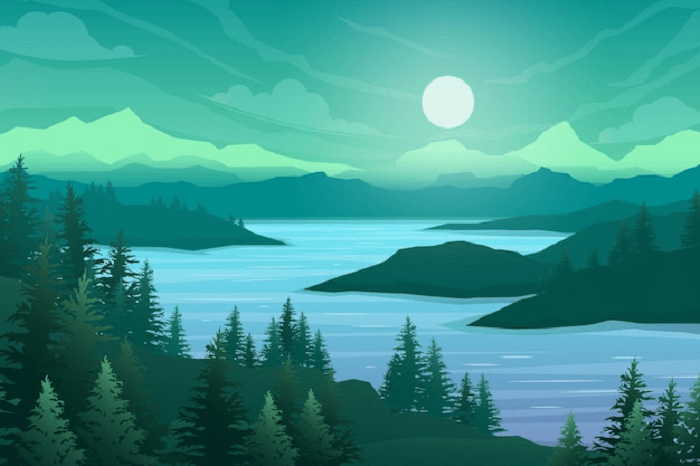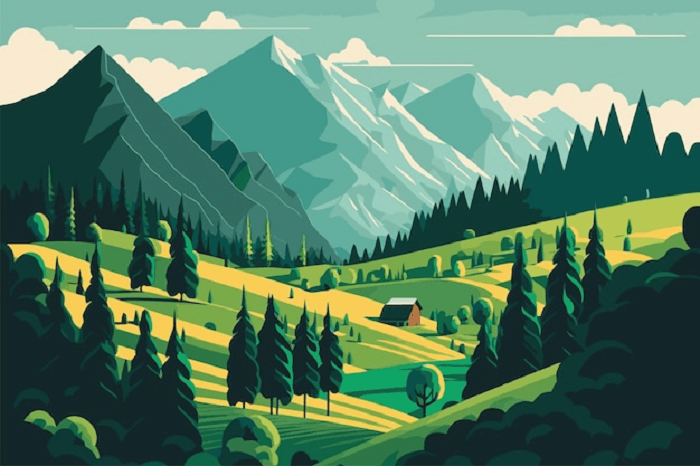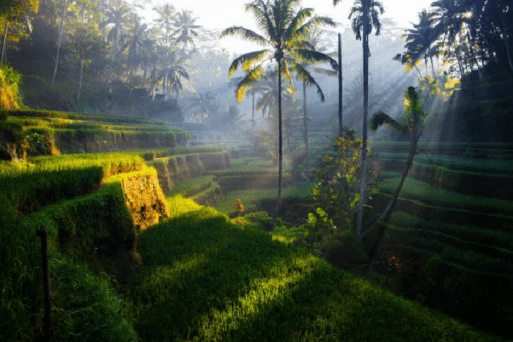Landscape DefinitionA region of land's visible features, including its landforms and how they blend with other natural and man-made elements, is collectively called a landscape. 
Landscape MeaningThis concept is frequently analyzed in terms of its aesthetic appeal. A landscape is made up of the physical components of geophysically defined landforms, such as (ice-capped) hills, mountains, and water bodies like rivers, lakes, ponds, and the sea. It also includes the living components of the land cover, such as native vegetation; human components, such as various land uses, buildings, and structures; and transient components, such as lighting and weather. Landscapes express a live synthesis of individuals and places essential to local and national identity by combining their physical roots and the cultural overlay of human existence, frequently formed over millennia. The characteristics of a landscape influence how its inhabitants see themselves and create a feeling of place that sets one location apart from another. It provides a dynamic setting for people's lives. Farmland, a landscape park, or a wilderness can all be considered landscapes. The Earth is home to a wide variety of landscapes, including the icy landscapes of the poles, mountainous region landscapes, vast dry desert landscapes, islands, before coastal landscapes, heavily timbered or wooded landscapes, including former boreal forests and tropical rainforests, and agricultural landscapes in temperate and tropical regions. Landscape design is the process of changing a piece of land's observable features. Various definitions of what a landscape is vary based on the situation. However, in everyday speech, the term "landscape" can either apply to all the distinguishable physical characteristics of a region of land (often rural), which are frequently valued for their aesthetic appeal, or to a representation of a rural location in a painting, specifically one that falls under the category of landscape painting. Although the finished product may not technically qualify as a landscape by certain definitions, it is considered to have been landscaped when humans consciously work to improve the visual appearance of a plot of land-by altering contours & vegetation, etc. 
Terminology HistoryFollowing the advent of the Anglo-Saxons in England in the fifth century, the term "landscape" entered the language and described a network of man-made areas on the land. Around the beginning of the sixteenth century, the term "landscape" was coined to designate a painting whose main subject was a natural scene. The word "land," which has Germanic origins, can also mean "something to which people belong" (as in the case of England being the "land of the English"). The English suffix -ship is the equivalent of the -scape suffix. The word "ship" has etymological roots that are related to the word "shape" in Old English (sceppan or scyppan). Shape and -ship is also connected etymologically through the suffix -schaft, which is connected to the verb schaffen. The term "landschap," which Dutch painters first used to describe paintings of inland natural or rural scenery, gave rise to the contemporary version of the word with its implications for scenery in the late sixteenth century. The term "landscape," first used in English in 1598, was derived from a phrase used by Dutch painters. The words "landscape" and a number of others are commonly used interchangeably. The natural elements of a landscape are assessed in terms of how they appear, especially when picturesque: breathtaking mountain scenery. Setting establishes the main background and mood of a tale by describing the historical era and geographical setting in which a narrative (particularly fictitious) takes place. 
According to the Oxford English Dictionary, the word "picturesque" literally means "in the manner of a picture; fit to be made into a picture." It is derived from the Italian pittoresco, which means "in the manner of a painter." According to Gilpin's Essay on Prints (1768), "a term expressive of that peculiar kind of beauty, which is agreeable in a picture" was used to describe picturesque.
Next TopicMarket Segmentation Definition
|
 For Videos Join Our Youtube Channel: Join Now
For Videos Join Our Youtube Channel: Join Now
Feedback
- Send your Feedback to [email protected]
Help Others, Please Share










